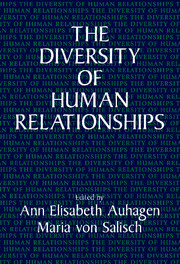Book contents
- Frontmatter
- Contents
- List of contributors
- Acknowledgments
- Introduction
- I Foundations
- II Relationships within the family
- 4 Parent–child relationships: Childhood and adolescence
- 5 Relationships between adult children and their parents
- 6 Relationships between adult siblings
- 7 Relationships in the extended family and diverse family forms
- III Partnerships
- IV Private nonkin relationships
- V Relationships at work
- Epilogue
- Author index
- Subject index
5 - Relationships between adult children and their parents
Published online by Cambridge University Press: 20 May 2010
- Frontmatter
- Contents
- List of contributors
- Acknowledgments
- Introduction
- I Foundations
- II Relationships within the family
- 4 Parent–child relationships: Childhood and adolescence
- 5 Relationships between adult children and their parents
- 6 Relationships between adult siblings
- 7 Relationships in the extended family and diverse family forms
- III Partnerships
- IV Private nonkin relationships
- V Relationships at work
- Epilogue
- Author index
- Subject index
Summary
Intergenerational solidarity: myths and findings
Relationships between elderly parents and their adult children are not a traditional topic for those research disciplines that otherwise concern themselves with parent–child relationships during childhood and youth – that is, family sociology, developmental psychology, and socialization research. The subject started to interest researchers when a demographic change became more evident during the 1950s: a steady increase in the number of elderly and very old people. Interest began to focus on the sociostructural effects of this previously unknown type of age structure on intergenerational relationships between aging parents and their adult offspring.
Early studies showed that, contrary to general opinion, lively relationships existed between adult children and their parents, but that both parents and children preferred not to live under the same roof. At almost the same time new expressions were coined, such as “inner closeness through external distance” (Tartler, 1961) and “intimacy at a distance” (Rosenmayr & Köckeis, 1965), that still aptly characterize attitudes of parents and children today. Virtually the same results were found in the United States (Shanas et al., 1968; Sussman, 1965). Despite this, the opinion was, and is still being upheld, that traditional care for the elderly within the family is coming to an end as a result of modernization processes such as urbanization, bureaucratization, and individualization. Although this sweeping statement is unfounded, as historical family research shows (Mitterauer, 1976; Ehmer, 1982), the never-ending lamentations of cultural pessimists about vanishing family solidarity still beg confirmation.
- Type
- Chapter
- Information
- The Diversity of Human Relationships , pp. 106 - 119Publisher: Cambridge University PressPrint publication year: 1996
- 1
- Cited by



